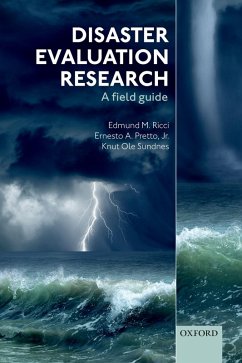A human disaster is defined as a hazardous event that overwhelms the capacity of the local community to respond to the needs of the affected population. Medical and public health responses aim to provide care efficiently and promptly but all too often, responses are hampered by recurring mistakes. Analysing the factors at play such as the scale and frequency of disasters and the variety of challenges they present, is central to developing more effective response plans. However the complexity of disasters often precludes reliable data collection, hampering the accuracy of the results, conclusions and recommendations required to improve responses. Disaster Evaluation Research: A field guide presents a new approach to the study of disaster by incorporating a mixed-methods research approach. This practical manual provides a range of reliable methods, robust approaches and proven techniques for the gathering and analyzing of data. Written by leading evaluation scientists with a wealth of experience, the authors present their 'EIGHT Step Model' for disaster evaluation studies. This framework applies evaluation science to disaster responses, helping scientists to select key stakeholders effectively, write evaluation questions, use logic models and mixed-methods research design, prepare sampling plans, collect and analyse data, and prepare a final report. This guide also features useful tools for carrying out evaluations including; evaluation questions, indicators and data sources, resources, and questionnaires used in past evaluation studies. Using a clear, accessible and step-by-step style this practical manual is easy to use in the field and essential reading for medical and public health professionals involved in disaster preparedness and response, humanitarian relief workers, policy analysts, evaluation scientists and epidemiologists.
Dieser Download kann aus rechtlichen Gründen nur mit Rechnungsadresse in A, B, BG, CY, CZ, D, DK, EW, E, FIN, F, GR, HR, H, IRL, I, LT, L, LR, M, NL, PL, P, R, S, SLO, SK ausgeliefert werden.


